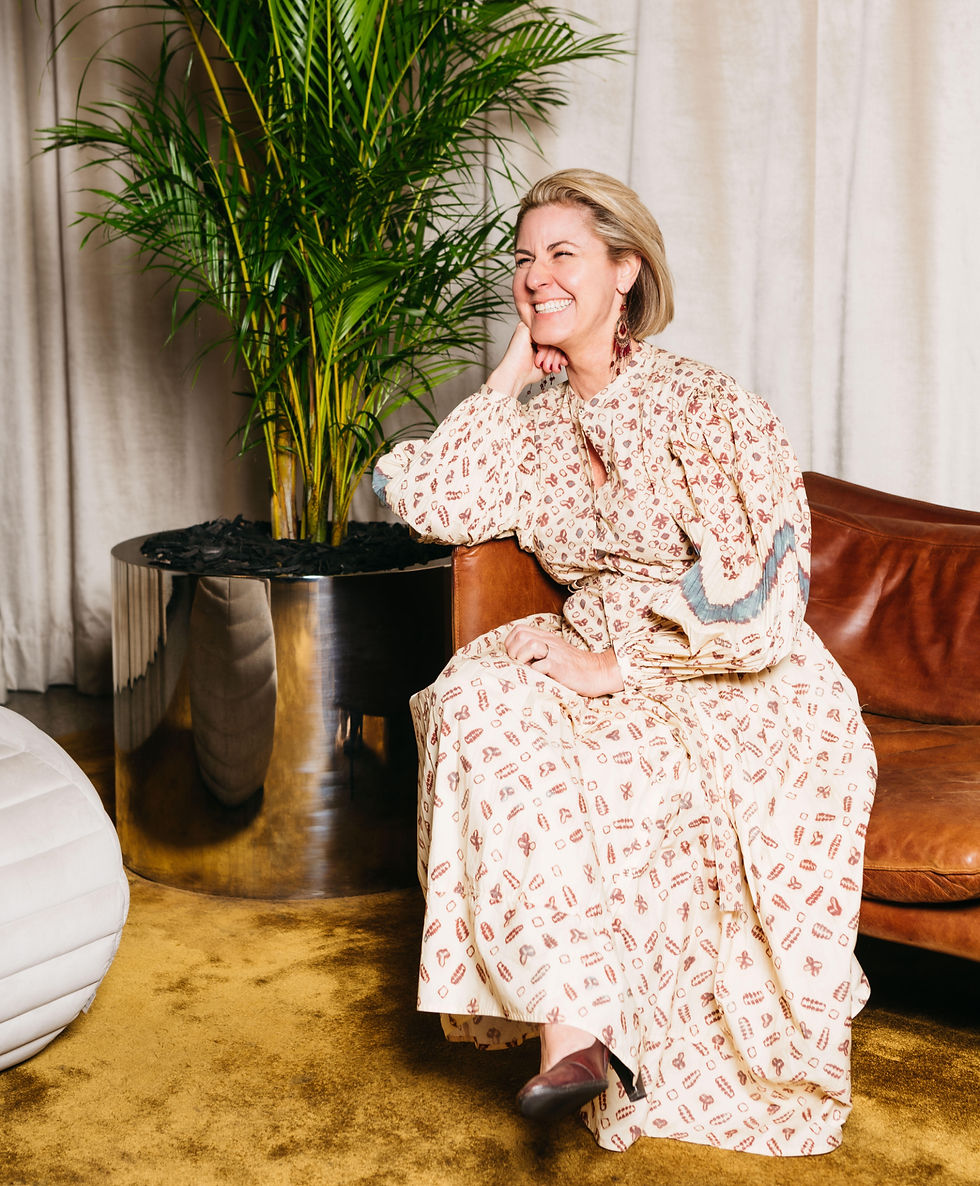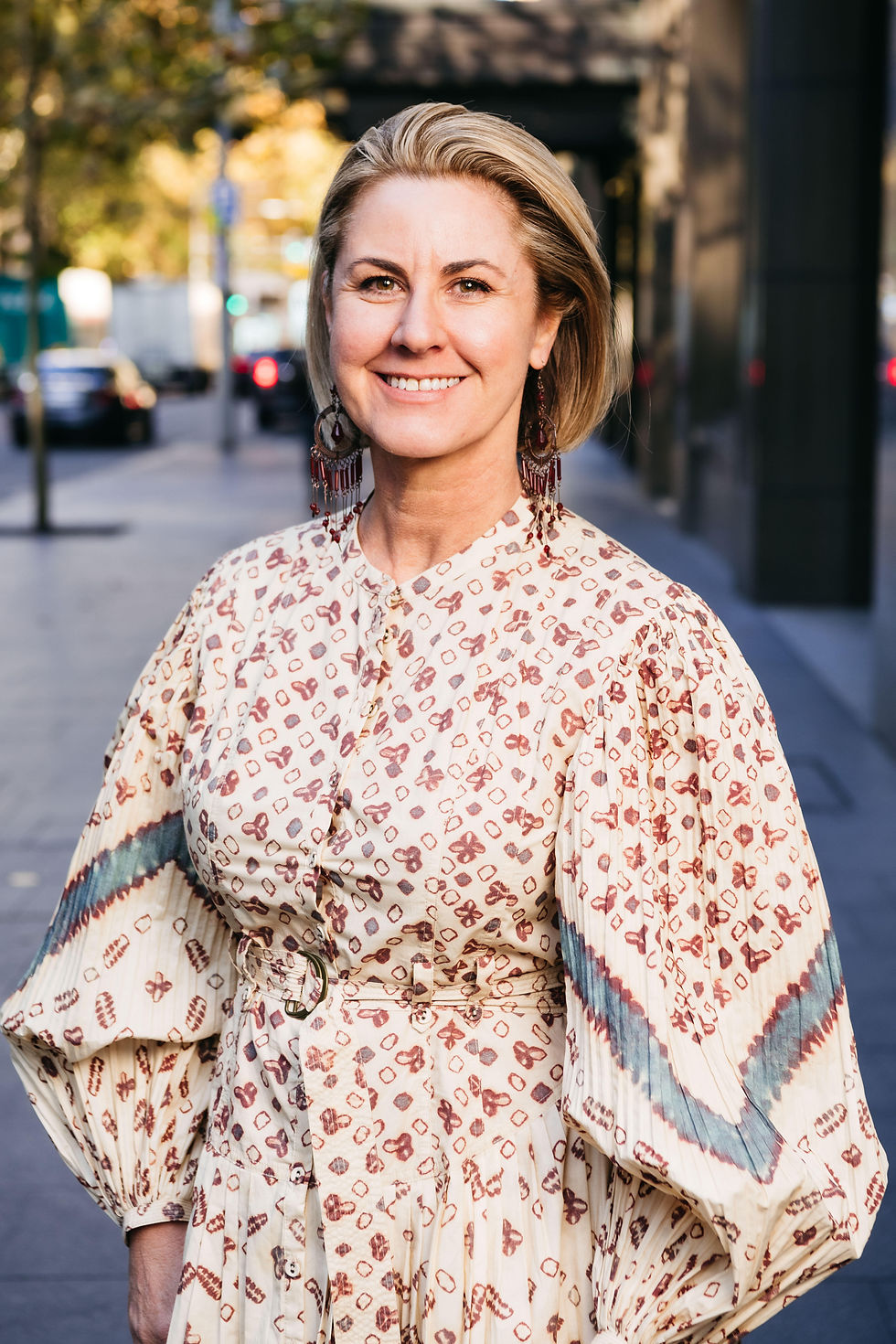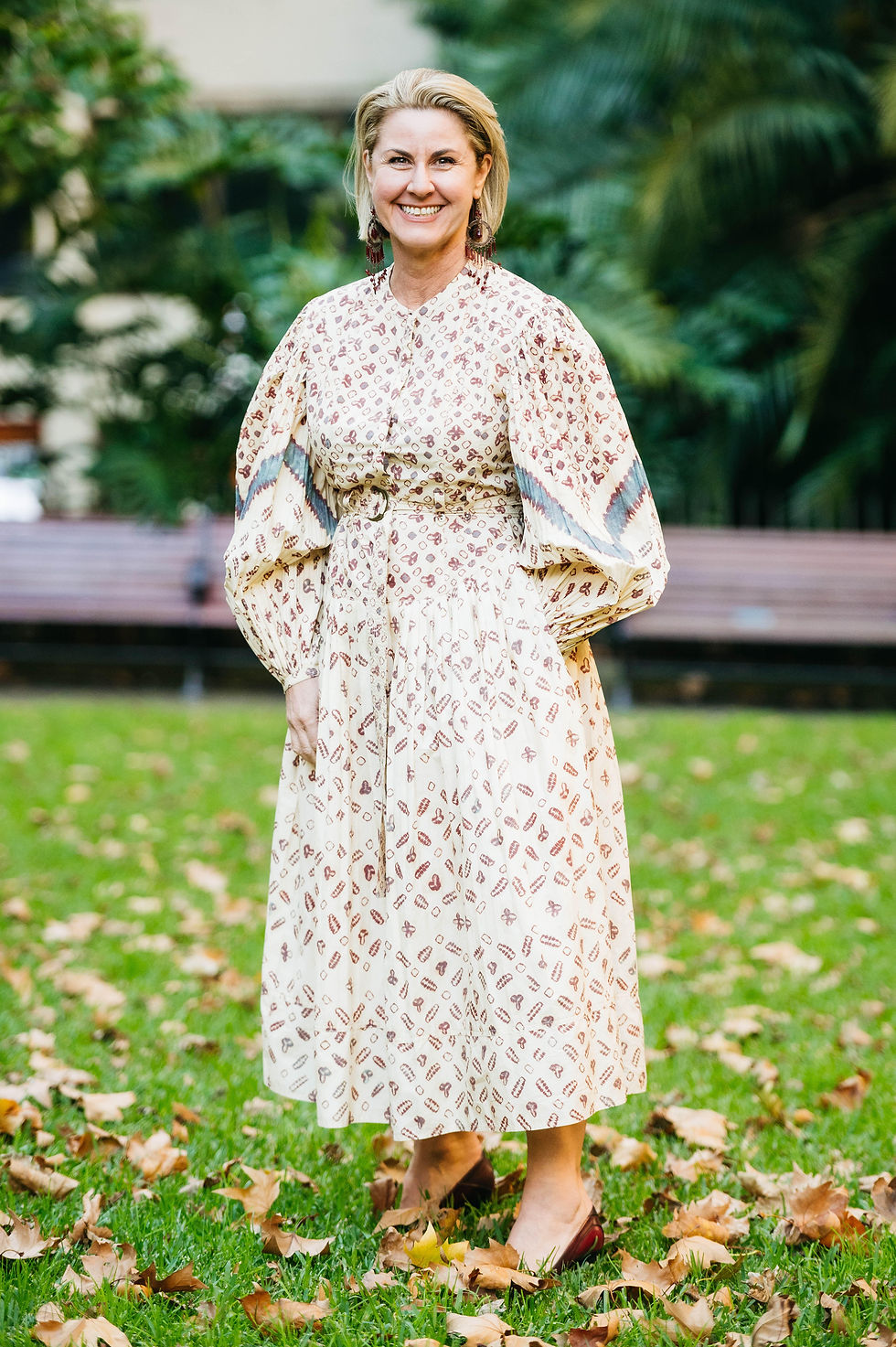Value+d: Unwrapped with F&B Challenger Brand Expert Chelsea Ford
- Anna Phillips
- Dec 16, 2024
- 11 min read
A blog series that uncovers the inspiring journeys of our founders and collaborators in the Value+D program
This series offers a behind-the-scenes look at the transformation happening in regional NSW communities and the next generation of sustainable, health-focused products, alongside the experts helping to bring them to life.

We had the pleasure of sitting down with Chelsea Ford, a dedicated supporter of our founders and a long-time collaborator in our accelerator programs. As the founder of the Foodpreneurs Festival, Chelsea has her finger on the pulse of the Australian food and beverage market, especially when it comes to championing emerging and challenger brands. In our conversation, we explored her insights into the evolving retail landscape, her mission to empower small Consumer Packaged Goods (CPG) brands and her commitment to fostering innovation, sustainability and consumer choice.
What led you to create the Foodpreneurs Festival? Was there a moment or experience that really sparked your mission to support emerging CPG brands?
My journey in the consumer packaged goods (CPG) industry spans over 30 years, leading teams at global giants like Kellogg, Nestlé, Sara Lee (and even turned around the Airblade business at Dyson!) At Kellogg, innovation was scarce, the only new idea was a muesli bowl I developed for cafés. Everything else? Just the same old plastic sleeves of grains and fruit, with no exciting new flavours or packaging (yawn). It was uninspiring.
That’s why I left BIG CPG and FOOD. I kept asking, “Where’s the innovation? Where’s the choice?” So I quit, moved to a mountain in Peru, meditated with a Shaman, and reconnected with my true passions. When I returned, I noticed the only real innovation was coming from smaller brands. The specialists and the challengers. These creators had brilliant products but didn’t know how to commercialise their products for true scale and profitably. That’s when my two passions creativity and business growth came together. I knew there had to be a way to modernise the industry and create space for emerging and challenger brands to thrive. So I took the leap. It was scary leaving a lucrative 20+ year career, but as brand owners we need to be driven by something bigger than fear.
This led me to launch my growth consultancy helping brand owners scale in 2015, to create Females in Food® to help women grow food and drink wholesale brands in 2016 and the Foodpreneurs Formula coaching program in 2020. Then, in 2023, I went on to found Foodpreneurs Festival, Australia’s first event of its kind opening doors for brand owners, industry specialists, media and buyers to come together for a year’s worth of sales + promotion opportunities under the one roof. It sold out immediately, and the next year too!
My mission has always been to give consumers more choice and help emerging and challenger brands (brands like yours) make their mark. We’re not just building businesses; we’re changing the industry, disrupting the norm, championing innovation and offering something better, something new, something that’s more than just the same old flavour rotations loved by multinationals.
With so much shelf space going to private labels these days, why do you feel it’s so vital to champion smaller brands in the market?
It has LONG been my mission to modernise the CPG industry, one emerging brand at a time and things in the industry aren’t going the way I think they should for emerging + challenger brand owners right now.
Here’s how they’re not; there’s a decline in independent supermarket store numbers and an upswing in consumers purchasing grocery store private label products. This means the real opportunities to get on, and off, the shelf for brands right now is challenging. So with that industry landscape, this is what I’m doubling down on:
Championing cutting-edge product development, technology and practices that redefine the CPG landscape.
Supporting and nurturing emerging brands within the CPG sector, fostering an ecosystem where small players can thrive.
Actively promoting gender equality and supporting women entrepreneurs and leaders in the CPG industry.
Driving healthy competition within the CPG market, ensuring fair practices and a level playing field for all brands.
How do you think the dominance of private labels is affecting both the industry and everyday shoppers? And what part does the Foodpreneurs Festival play in giving independent brands a fighting chance?
For everyday shoppers, the rise of private labels might seem like a win = lower prices, decent quality but it comes at a cost: fewer choices, less innovation and a market increasingly dominated by a handful of players.
For example, it can be seen in the numbers. There’s been an upswing in purchasing of grocery store private label products.
37% Australian consumers say they switched to a private label to save money in recent months (EY 06/23).
66% say private store labels satisfy their needs as much as branded products.
64% consumers globally believe PL products are as good as branded ones (EY 05/23).
55% think supermarket labels are increasingly offering better quality products.
And Australian consumer packaged goods brands face extinction. Vegemite, Aeroplane Jelly & Meadow Lea are all examples of the demise. (AuManufacturing 10/23).
This data suggests that emerging consumer packaged goods brands are under threat.
That’s why the Foodpreneur Festival exists: to equip emerging brands with the tools, connections, and insights they need to stand out. Foodpreneurs Festival, food, drink and pet food brand owners, is a years’ worth of sales + promotion opportunities, in one day, all under one roof.
Brand owners can apply to:
pitch to wholesale buyers
discuss product plans with industry experts
shake off industry challenges with peers
expand their network
showcase their products
and hear mistake-saving advice.
The festival is an opportunity to take emerging + challenger brands to new heights. It’s a day of learning, networking, and personal growth!
You speak so passionately about the importance of innovation and variety on retail shelves. Can you share a few examples of products or brands you've worked with that truly embody these values?

Innovation and variety are the lifeblood of the CPG industry and I’m fortunate to have worked with brands that are redefining what it means to offer something unique on retail shelves.
Six-Eyed Scorpion is a specialty brand that took bold steps to elevate their range from farmers’ markets to select specialty retailers. They’ve mastered the art of brand storytelling, creating a product lineup that not only tastes exceptional but connects emotionally with its audience.
Springhill Farm has reimagined the way we think about traditional treats. By blending heritage recipes with a modern twist, they’ve introduced innovative formats and flavours that stand out in a crowded snack category, delivering nostalgia and novelty in equal measure.
Isaac’s Snacks demonstrates the power of simplicity done right. With a focus on health-conscious consumers, they’ve developed wholesome snack options that challenge the typical “better-for-you” narrative with genuinely delightful and crave-worthy products.
Bar None is a shining example of transformation and growth. Through strategic rebranding and innovation, they’ve positioned themselves as a category leader, focusing on refrigerated, allergen-friendly snacks with mainstream appeal, proving that small brands can tackle big retail ambitions with the right approach.
Each of these brands embodies the spirit of creativity, perseverance, and adaptability. They’ve challenged the status quo, offering consumers something exciting and meaningful while pushing the boundaries of what’s possible in CPG.
What are some of the biggest hurdles that small, independent brands face when competing with big players? How does the festival help them take on these challenges?
Small, independent brands face a series of steep challenges when competing with big players who dominate shelf space and consumer attention. Some of the most significant hurdles include understanding buyer motivations, effectively pitching products, scaling sustainably and managing profitability. All while trying to cut through the noise of a crowded marketplace.
For many emerging brands, industry know-how is a major barrier. They might not fully grasp the unspoken rules of the retail landscape, such as what buyers truly look for or how to position their brand to stand out. A lack of understanding around buyer behaviour, including how buyers measure success and make decisions, often results in missed opportunities to secure stockists. Another challenge is building the confidence and skills to pitch products effectively and navigate sales planning, turning buyer interest into concrete accounts and doubling revenue through realistic, actionable sales strategies. Even once products are on shelves, ensuring they don’t just sit there is a hurdle; brands need to focus on shelf presence, marketing and making their products irresistible to consumers without overspending. Finally, scaling up involves its own complexity, including mastering distribution, pricing for profitability and executing growth strategies that align with both market demands and the brand’s long-term goals.
Foodpreneurs Festival addresses these challenges by bringing together industry experts, wholesale buyers and emerging brand owners under one roof. It provides an unparalleled opportunity for small brands to connect with those who understand the nuances of the industry, gain insights into buyer behaviour and showcase their products to key decision-makers. The festival’s structure is designed to facilitate networking, learning and business growth, giving brand owners the platform they need to overcome industry challenges and thrive.
You’re also involved in accelerator programs like ours for emerging agrifood brands. What inspires you to be part of these programs, and how do you see them fitting in with your larger mission?
Accelerator programs like yours are vital to fostering the next wave of innovation in the agrifood industry. What inspires me most about being part of these initiatives is the opportunity to champion diversity and inclusion, both in terms of the people leading these brands and the products they create. The agrifood space thrives when it reflects the rich diversity of our communities. This means welcoming brand owners from different backgrounds, experiences and perspectives, while also supporting the development of products that cater to a wider array of consumer needs. Inclusion is not just about equity, it’s a competitive advantage, as it leads to greater creativity, innovation and market relevance.
These programs align perfectly with my mission to modernise the CPG industry. By equipping a diverse range of emerging brands with the tools, networks and opportunities they need to succeed. We’re collectively working to level the playing field and open doors that have traditionally been hard to access. I’m inspired every day by the resilience and passion of brand owners in these programs. They’re not just building businesses; they’re redefining what the industry can be: more innovative, more inclusive and more reflective of the values consumers care about today. It’s a privilege to play a small part in their journey.
For smaller brands trying to make their mark, what would you say are the most important things to focus on to stand out and build customer loyalty?
Standing out in today’s competitive market and building customer loyalty requires a mix of strategic focus and deep understanding of the industry landscape. Here’s what I recommend:
Master Your Positioning: The foundation of standing out is knowing where your brand fits in the market. Too many small brands struggle to cut through the noise because they fail to define their unique value proposition. Position your brand around what makes you different not just your product but the story, purpose and values behind it.
Understand the Industry’s Unspoken Rules: Many small brands falter because they don’t fully grasp the "underbelly" of the industry. Retail and wholesale relationships run on specific protocols and language. You need to know how stockists think, what they value, and how to meet their expectations. This knowledge is critical to gaining shelf space and maintaining it.
Get Inside Your Buyer’s Mind: Understanding buyer behaviour is crucial. Buyers are motivated by numbers and trust. They want to see how your product performs and how it solves a gap in their category. By aligning your pitch with what buyers care about: profitability, consumer demand and differentiation - you significantly increase your chances of a “yes.”
Create an Irresistible Product Pitch: A well-crafted pitch isn’t just about presenting your product; it’s about showing its potential. Focus on the value your product brings to the wholesale buyer, not just to the consumer. Whether it’s a formal meeting or a casual conversation, you must be prepared with a script, clear benefits and answers to objections.
Prioritise Sales Planning and Distribution: Getting on shelves is the end of phase one. To succeed long-term, you need a solid sales plan and the right distribution strategy. Think about which wholesale buyers align with your brand, set achievable goals for expansion, and make sure your operations can scale without compromising quality.
Know Your Consumer Inside-Out: Loyalty begins with deeply understanding your target customer. What do they want, and how does your brand fulfil that need better than others? This isn’t just about product attributes; it’s about creating an emotional connection through your messaging, branding and customer experience.
Focus on Profitability, Not Just Growth: Many small brands chase growth at the expense of profitability. You need to price your product correctly to cover costs, meet wholesale margin expectations and leave enough profit to reinvest in your business.
Think Long-Term with a Growth Strategy: Sustainable growth doesn’t happen by chance - it requires a plan. Set clear milestones for where you want your brand to be in one, three, and five years. Then, work backward to identify the steps needed to get there.
Building a standout brand and loyal customer base takes time, focus and a willingness to learn. The brands that succeed are those that approach the process with clarity, resilience and a commitment to mastering the fundamentals of business strategy and implementation.
Integrity and sustainability are such core values for you. How do you help the brands you work with bring those qualities into their products and businesses?
Integrity and sustainability are at the heart of everything I do and they’re crucial elements in building a brand’s long-term success. Here’s how I help brands integrate these values:
Emphasise Authentic Storytelling: Building a brand’s integrity starts with authentic storytelling. I work with brands to uncover and communicate their true values and the reasons behind their commitment to their product development and growth ambitions. Whether it’s using sustainably sourced ingredients, adopting eco-friendly packaging, supporting fair trade practices, or something else, we create a narrative that resonates with consumers and aligns with their personal values.
Building a Sustainable Business Model: Helping brand owners understand the importance of creating a business model that balances growth with profitability. This involves strategic pricing, effective cost management and maximising operational efficiency. It’s about helping brand owners establish a sustainable financial foundation, ensuring their business not only survives but thrives in the long term. By guiding them through the complexities of pricing, distribution and production costs, I empower them to make informed decisions that drive commercial success while staying true to their life outside of their business.
Fostering a Culture of Integrity: Creating a culture of integrity within a brand is essential. I work with brand leaders to instil values across their teams, ensuring that sustainability isn’t just a box to tick but a core part of the company’s identity. This includes fostering transparency in business practices, fair treatment of job applicants and employees and responsible marketing that aligns with what the brand is actually doing behind-the-scenes.
Encouraging Continuous Improvement: Sustainability is an ongoing journey, not a one-time achievement. I help brands establish a culture of continuous improvement, where they regularly revisit their planning and initiatives and evolve them in response to new challenges and opportunities. This might involve updating product formulas, finding new suppliers, or innovating in packaging to ensure that their efforts remain relevant and impactful over time.
By integrating integrity and sustainability into their products and business strategies, brands can build deeper connections with consumers and position themselves as leaders in their industries. These values are not just good for the planet; they’re good for great business outcomes.

For any emerging brands out there or others who want to support your mission, what’s the best way for them to connect with you and get involved with the Foodpreneurs Festival?
When they’re ready to take the next step, there are 4 ways I can support their journey:
Become a CF Insider: Never miss out on industry insights, updates, and exclusive content.
Join Foodpreneurs Festival: Australia’s unmissable event where food, drink, and pet food founders connect with influential industry leaders and hundreds of fellow brand owners.
Listen to the Podcast for Food, Drink & Pet Food Brands Wanting to Grow: Discover game-changing strategies and insider insights from industry leaders on the Foodpreneurs with Chelsea Ford Podcast.
Ask Me Anything: Got a burning question about the consumer packaged goods (CPG) industry? Get expert answers in my weekly industry expert email, social media or podcast episode.
I'm sure you'll all agree that hearing Chelsea’s vision and wisdom is extremely energising. We love her fresh perspective on the opportunities for challenger brands in today’s market. If you’re as inspired as we are by her mission to empower emerging brands and advocate for greater consumer choice, connect with her on LinkedIn, or follow her story on The Foodpreneurs Festival Instagram and Facebook for more updates and insights.
>> If you missed our last interview with founder Nobu, click here to catch up.
Comments